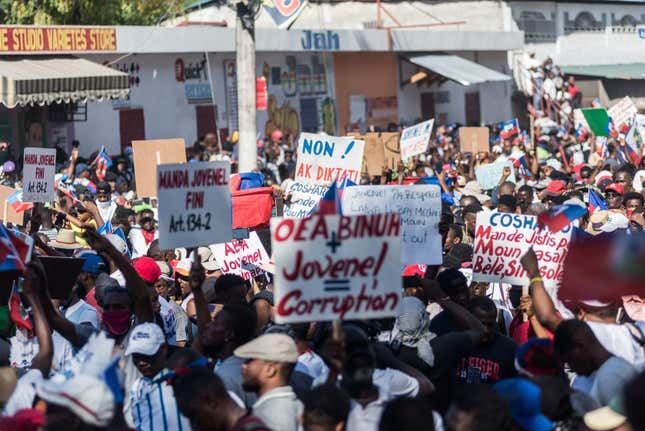
You may have seen #FreeHaiti making the rounds on Twitter, and though the hashtag has been shared by celebrities like Cardi B and influencers like Karen Civil, it originated from people in the Caribbean republic in response to the fatal outcome of a SWAT operation last weekend to seize gang members in the Village de Dieu, or Village of God, neighborhood in Port-Au-Prince.
According to a report from the Miami Herald, at least four police officers were killed in the raid, after which videos emerged on social media showing gang members dragging two of the cops’ bodies. Three other officers were wounded in the incident, reports the Associated Press, and gang members also stole armored vehicles and automatic weapons from law enforcement during the raid.
Haitian President Jovenel Moïse, in response to the deadly raid, told the gang members that “they will not win.” But Haitians at home and abroad are also asking to be freed from his government, as well as from the continuing violence in the nation.
From the Miami Herald:
An infographic, put together by the anti-corruption grassroots activist group Nou Pap Dòmi (We Aren’t Sleeping) for Augustin, sought to explain the movement in four graphs and what people can do. One of the graphics, titled “Why do we say #FreeHaiti?” explains why Haiti, the first country in the Americas to break the bondage of slavery, needs to be liberated: “There is no parliament, no elected local officials, the judiciary system is under attack, the president wants to change the constitution and hold elections while gangs control many parts of the territory. There is a surge in kidnappings at a scale never seen before.”
For-ransom kidnappings have increased by 200% in the last year, according to the United Nations, armed gangs are growing in influence and an ongoing standoff between the president, Jovenel Moïse, and activists over when his term ends is fueling a new round of protests. Many fear that Moïse, who has been ruling by decree for over a year, is on the verge of becoming the newest strongman in the Americas.
Protests erupted in Haiti last month following Moïse’s refusal to leave office on February 7, though opposition party members and Haitian citizens say his term in office is over based on the rules of the constitution.
Moïse has argued that he still has time remaining in his presidential term. He is pushing for a constitutional referendum later this year, after which he says there will be legislative and presidential elections.
The Biden administration has maintained support for Moïse, based on the premise that the leader plans to hold elections this year.
But Democratic lawmakers, as well as members of Haiti’s civil society and the country’s diaspora, have continued to flag that the situation in Haiti is untenable.
“President Moïse has ruled by decree for fourteen months,” said New York Rep. Gregory Meeks at a virtual hearing of the House Affairs Committee last week. “Haitian parents are afraid to send their kids to school or travel to work, not just because of the pandemic, but because kidnapping and gang violence have spiralled out of control.”
“The U.S. government should recognize that past foreign-led attempts aimed to strengthen democracy in Haiti have not led to progress and have even been counterproductive. It is time to follow the lead of Haitian civil society in determining when to support elections in Haiti and respect the current effort to solve the crisis as they want to,” Haitian activist Emmanuela Douyon told Voice of America news.
Secretary of State Antony Blinken testified to the House Affairs Committee last week that he was concerned about authoritarian and undemocratic actions in Haiti, and that the U.S. wants to see the country have “genuinely free and fair elections this year” with international support.

